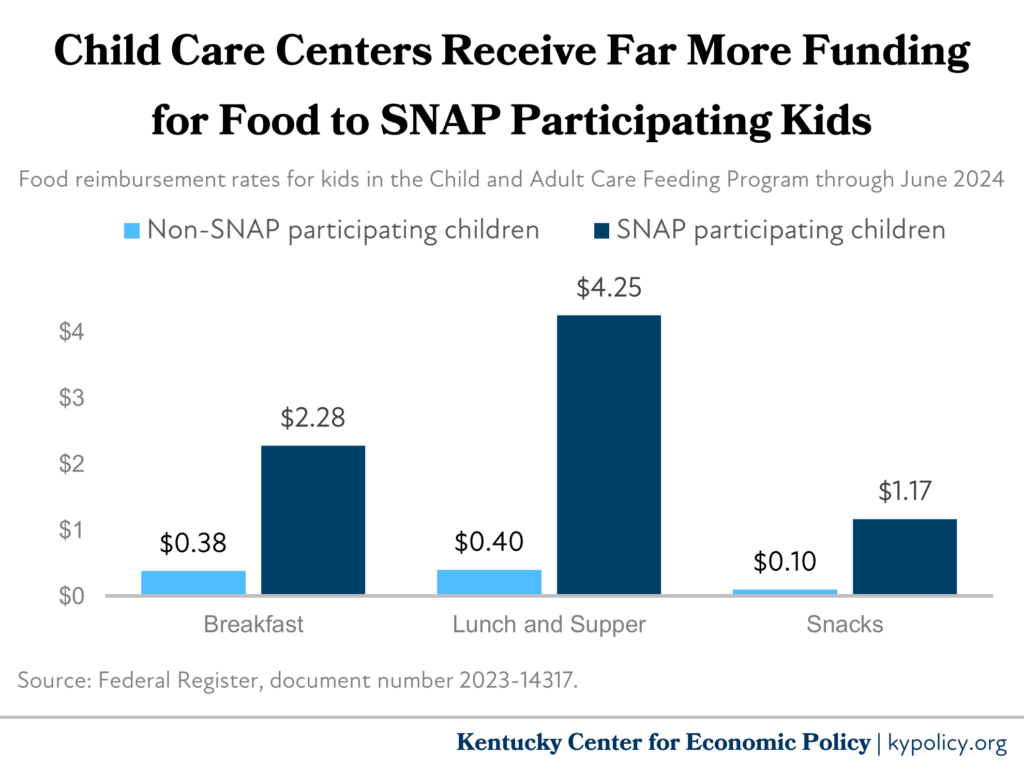House Bill (HB) 367 would make significant cuts to food assistance in the Supplemental Nutrition Assistance Program (SNAP) in two separate ways.
- It would end the state’s ability to have a slightly higher income limit for SNAP participation and force it reinstate the now-waived limit on how much households with SNAP can have in savings. This approach is known as Broad Based Categorical Eligibility (BBCE), which is the standard option that Kentucky has long implemented alongside 42 other states and the District of Columbia. Nearly all households in Kentucky use BBCE as a part of their application process and eliminating it would affect all of them, regardless of age or who lives in the household.
- It would cut access to SNAP by preventing the state from waiving the work reporting requirement for some adults in areas of the state with high joblessness.
Together, these two policies would lead to tens of thousands of Kentuckians losing food assistance, either because they no longer meet the modest income threshold, their assets rise above the new, low threshold, or they get caught up in difficult paperwork requirements. HB 376 would worsen hunger and poverty in the commonwealth and hurt local economies when they need the help the most.
HB 367 would take food assistance away from tens of thousands by eliminating Broad Based Categorical Eligibility
The first of two ways HB 367 would take food assistance away from Kentuckians is through banning the state from implementing BBCE for either income or assets. This would effectively reduce the gross income limit from 200% of the Federal Poverty Level (FPL) to 130% of the FPL (not the net income limit, explained below), and mandate that applicants for SNAP prove they have assets below $2,750 (or $4,250 for seniors and people with disabilities).
Using the gross income limit of 200% of the FPL still means targeting SNAP to low-income families. That’s because all households must have net incomes below 100% FPL after taking certain household expenses like utilities and medical costs into account regardless of their gross income. But reducing the gross income threshold means roughly 19,000 Kentucky households where more than 48,000 Kentuckians live – including 21,400 kids and 4,400 seniors – will have their food assistance taken away because they have gross incomes between 130% and 200% FPL, according to agency data.
At least 6,400 more households where 16,800 Kentuckians live would lose SNAP because of the asset test required in HB 367, according to agency estimates. Nearly all households in Kentucky participate in SNAP through BBCE, and eliminating this standard, federally-allowed approach would result in some who are above the asset limit losing their food assistance because they have various kinds of savings, even small amounts. Further, many more would likely lose their food assistance from paperwork errors associated with proving the value of their assets, which is a lengthy and cumbersome process.
Banning BBCE would mean nearly 65,000 Kentuckians would lose food assistance, taking approximately $110 million in federally-funded assistance with groceries out of our state and local economies each year.
Eliminating BBCE under this legislation would have far-reaching effects. First of all, it would exacerbate the benefits cliff by disincentivizing SNAP participants to earn higher wages, take on more hours at work, and put more into savings. SNAP is a work support, and phases out as wages increase, so having a higher gross income limit means the benefits phase out more gradually. But changing the gross income standard and enforcing an asset test, as HB 367 does, creates a much sharper drop-off in benefits. Ironically, this provision would disproportionately punish working SNAP participants with some earnings (as most SNAP-participating adults are), and seniors with some form of savings.
Banning BBCE will result in a minimum of 21,400 children losing SNAP, which will threaten funding for school meals and food at child care centers. Community Eligibility for school meals (CEP) and the Child and Adult Care Feeding Program (CACFP) are both partially determined by child SNAP participation. In 2021 (the most recent year data is available) 709 of Kentucky’s 1,990 child care centers participated in CACFP. Kicking kids off SNAP through the elimination of BBCE would reduce federal funding for food at participating child care centers by tenfold at a time when we all know child care providers are already on the edge of closure.

Eliminating BBCE through HB 367 would also require that all 588,000 Kentuckians verify the total worth of their assets, a labor-intensive process involving the verification of financial documents and cross-referencing against existing databases. This process would be performed by the same state workers that verify eligibility for Medicaid, Child Care Assistance, and other vital programs. This added burden would result in longer call hold times, higher agency errors, and more administrative expense for every program in the Division of Family Supports.
Preventing the state from waiving work reporting paperwork will take food assistance away from 15,800 Kentuckians in economically distressed counties
The second way HB 367 makes cuts to SNAP is by prohibiting the executive branch from quickly waiving the work reporting requirement for some adults in areas with high joblessness. Downturns can come quickly across the state, or in individual counties, and is often much deeper in some parts of the state than others. During the initial months of the COVID pandemic, for example, the unemployment rate spiked from 4% to 16%, and the Great Recession and severe loss of coal jobs with the rise of cheap natural gas resulted in very high unemployment for dozens of counties over the last 15 years. Our economic recovery from these setbacks would have been so much worse without the state’s ability to waive that requirement and get federal dollars into local economies through SNAP, which doubles its value in economic activity during a downturn.
Making this change now would result in 15,800 Kentuckians being newly at risk of losing SNAP due to onerous work reporting requirements despite living in counties that the USDA has approved based on the poorer economic conditions there.
Currently, the Department for Community Based Services (DCBS) has the authority to request these work reporting requirement waivers from the U.S. Department of Agriculture under strict criteria, and the General Assembly has already set forth its own criteria for when this can happen. When the cabinet does request such waivers from the USDA, they must inform the General Assembly that they have done so, giving the legislature oversight of these decisions. This flexibility is well-regulated and transparent, and taking it away from the state leaves us ill prepared to care for our people in distressed times or parts of the state.
Updated Feb. 29, 2024




